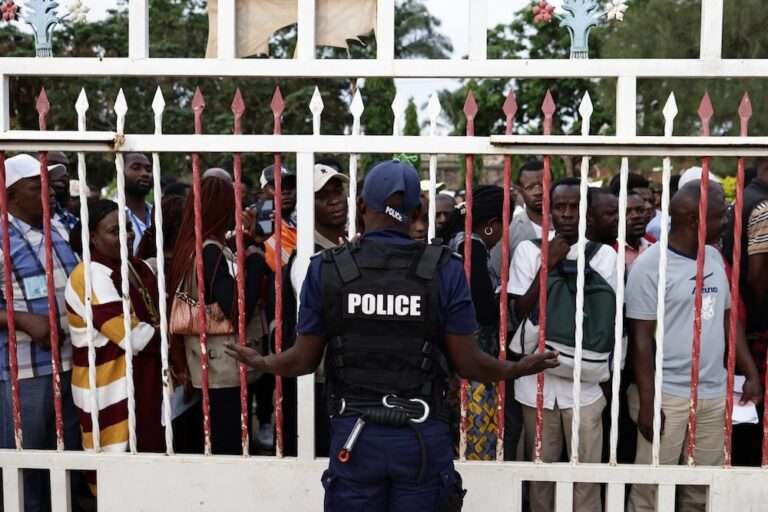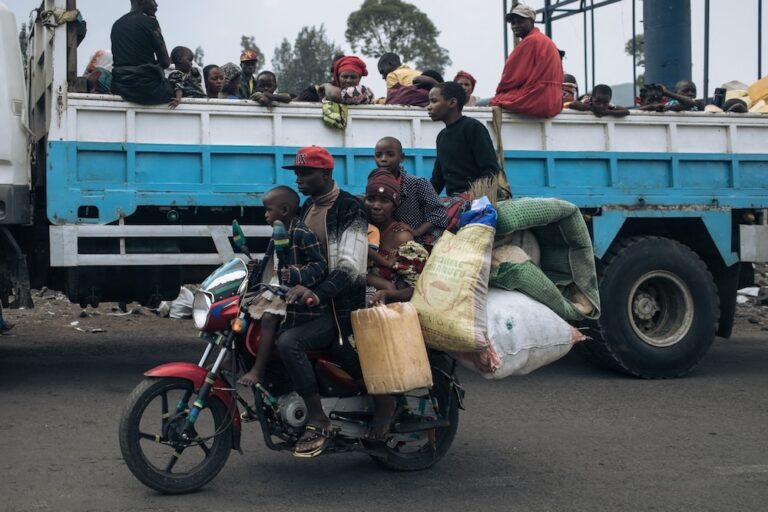(JED/IFEX) – In a 4 September 2000 letter to the public prosecutor of the Republic, Luhongo Kabinda Ngoy, JED called for the release of Franck Baku Fuita and Franck Ngyke, respectively editor-in-chief and head of the political column for the weekly “La Référence Plus”. Without entering into the substance of the two cases, JED said […]
(JED/IFEX) – In a 4 September 2000 letter to the public prosecutor of the Republic, Luhongo Kabinda Ngoy, JED called for the release of Franck Baku Fuita and Franck Ngyke, respectively editor-in-chief and head of the political column for the weekly “La Référence Plus”.
Without entering into the substance of the two cases, JED said that it “insists on respect for the two journalists’ right to equitable justice characterised by the presumption of innocence, respect for criminal procedure, assistance from lawyers, visits by family members and those close to them, correct treatment with regard to detention conditions, food and health care”.
JED also noted that the Democratic Republic of Congo is party to international legal instruments that guarantee the freedom of expression and opinion, notably, the Universal Declaration of Human Rights, the International Covenant on Civil and Political Rights, and the African Charter on Human and People’s Rights. The organisation maintained that “it is precisely in the name of these texts that no democratic country imprisons journalists over matters of the press”. In addition, JED specified that on 14 July 1992 the United Nations Human Rights Commission established that “imprisonment as punishment for the expression of an opinion constitutes one of the most reprehensible means to impose silence and, as a result, is a serious violation of human rights”.
Similarly, JED told the public prosecutor that “the arrest of Franck Baku and Franck Ngyke is in contradiction to the promises that you made to journalists gathered by our organisation in July 1999 at the time of the meetings with the press on legal matters that you had accepted to sponsor”.
According to information obtained by JED, Baku was arrested on Friday 1 September, on the order of the public prosecutor, while he was responding to an invitation to meet the public prosecutor in his office that day. Seized by an agent of the judicial police of the public prosecutor’s office (Police judiciaire des parquets), which issued a provisional arrest warrant, Baku was immediately sent to the cell known as the “Casier judiciaire” (“criminal compartment”) in Kinshasa/Gombe, in the late afternoon.
On Saturday 2 September, Baku was again heard, this time by an officer from the public prosecutor’s office near the High Court of Kinshasa/Gombe. This officer served notice to him that he was being charged with “insulting the magistracy”.
It is reported that Baku’s wrong is to have spoken of “iniquitous” justice with regard to a divorce case between a former dignitary of the deposed Mobutu regime and his wife, in an article published in the 31 August issue (number 1958) of the weekly.
On Monday 4 September, Baku was transferred to the Penitentiary and Re-education Centre of Kinshasa (Centre pénitentiaire et de rééducation de Kinshasa, CPRK, formerly the Central Prison of Makala).
As for Ngyke, he was arrested on Sunday 3 September at 7 a.m. (local time) at his home by agents in civilian clothes from the National Information Agency (Agence nationale de renseignements, ANR) and taken to a cell of this agency in Kinshasa/Gombe. The reasons for this new arrest of a journalist from “La Référence Plus”, in the space of 48 hours, are still not known.
In an e-mail to JED, Lumeya dhu Maleghi, a Kinshasa lawyer and member of the Congolese association of Lawyers Without Borders (Avocats sans frontières, ASF), offered to defend Baku and his colleague Ngyke.


